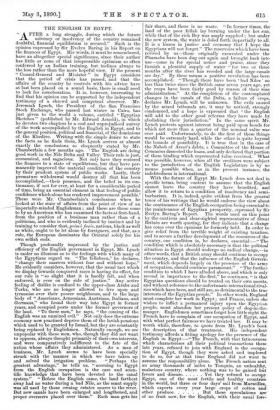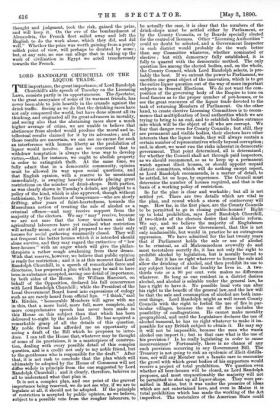THE ENGLISH IN EGYPT. "A FTER a long struggle, during which
the future solvency or insolvency of the country remained doubtful, financial equilibrium is secured." Such is the opinion expressed by Sir Evelyn Baring in his Report on the finances of Egypt. His words, it must be remembered, have an altogether special significance, since their author has little or none of that irrepressible optimism so often conferred by an Indian training, but inclines always to the less rather than the more hopeful view. If the present " Consul-General and Minister ' in Egypt considers that the period of crisis has passed, and that the affairs of the country he controls with his advice have at last been placed on a sound basis, there is small need to look for corroboration. It is, however, interesting to find that his opinion can be supported by the independent testimony of a shrewd and competent observer. Mr. Jeremiah Lynch, the President of the San Francisco Stock Exchange, who passed last winter in Cairo, has just given to the world a volume, entitled " Egyptian Sketches" (published by Mr. Edward Arnold), in which he devotes two chapters to a cool and unprejudiced survey of the work accomplished by the English in Egypt, and to the general position, political and financial, of the dominions of the Khedive. Writing with the simple desire to state the facts as he finds them, Mr. Lynch arrives at almost exactly the conclusions so eloquently stated by Mr. Chamberlain a few months ago. The English are doing good work in the Nile Delta and Valley. Their rule is just, economical, and sagacious. Not only have they restored the finances to a state of equilibrium, but they have per- manently improved the material condition of the country by their prudent system of public works. Lastly, their premature withdrawal would destroy all that has been accomplished,—their presence, and the belief in its con- tinuance, if not for ever, at least for a considerable period of time, being an essential element in that feeling of public confidence which alone has rendered improvement possible.' These were Mr. Chamberlain's conclusions when he looked at the state of affairs from the point of view of an ----ii4erially-minded Englishman ; and these are those come to by an American who has examined the facts at first-hand, from the position of a business man rather than of a politician, and who is evidently inclined by instinct and by training to consider that, primel, facie, nations, black as well as white, ought to be let alone by foreigners, and that, as a rule, the European dominates the Oriental solely for his own selfish ends.
Though profoundly impressed by the justice and efficiency of the English government in Egypt, Mr. Lynch is under no illusions as to the feelings with which many of the Egyptians regard us. " The fellaheen," he declares, " change their masters without fear and without hope." He evidently considers, however, that the usual tact which we display towards conquered races is having its effect, for our rule is " so slight that it is hardly felt, and when enforced, is ever on the side of justice." Any active feeling of dislike is confined to the upper-class Arabs and Turks, who are no longer allowed to live upon and tyrannise over their poorer neighbours, and to the large body of " Americans, Armenians, Austrians, Italians, and Germans," who found their way into Egypt in former years, and occupied posts under the former governors of the land. " To these men," he says, " the coming of the English was an unmixed evil." Not only does the extreme economy now practised deprive them of the lavish pensions which used to be granted by Ismail, but they are constantly being replaced by Englishmen. Naturally enough, we are unpopular with these men, who, though they did not want to oppress, always thought primarily of their own interests, and were comparatively indifferent to the fate of the nation whose affairs they administered. As a man of business, Mr. Lynch seems to have been specially struck with the manner in which we have taken up and solved the irrigation problem. " Perhaps the greatest advantage," he tells us, " accruing to Egypt from the English occupation is the care and scien- tific knowledge that have been devoted to the canal system." " Before the English came, the land farthest away had no water during a bad Nile, as the scant supply was all used by those owning estates nearer to the river. But now canals have been enlarged and lengthened, and proper overseers placed over them." Each man gets his fair share, and there is no waste. " In former times, the land of the poor fellah lay burning under the hot sun, while that of the rich Bey was amply supplied ; but under the new system, the water is doled forth impartially to all. It is a lesson in justice and economy that I hope the Egyptians will not forget." The reservoirs which have been revived by us—those originally excavated under the Pharaohs have been dug out again and brought back into use—come in for special notice and praise, since they furnish a plentiful supply of water " for two or three months after the river has receded and the large canals are dry." By these means a positive revolution has been accomplished. " Though there have been ' bad Niles' no less than twice since the British came seven years ago, yet the crops have been fairly good by reason of their wise administration." At the completion of the contemplated changes in the canals of the Delta, a failure of crops, declares Mr. Lynch, will be unknown. The evils caused by the mixed tribunals are, it may be noticed, strongly condemned, and a hope is expressed that " the English will add to the other good reforms they have made by abolishing their jurisdiction." In the same spirit Mr. Lynch protests against interest being paid upon bonds for which not more than a quarter of the nominal value was ever paid. Unfortunately, to do the first of these things would be extremely hard, while the other is quite beyond the bounds of possibility. It is true that in the case of the Nabob of Arcot's debts, a Committee of the House of Commons dissected the loans, and only declared that portion of them binding which represented -value received. What was possible, however, when all the creditors were subject to the jurisdiction of the English Legislature is by no means possible when, as in the present instance, the indebtedness is international.
With the future of Egypt Mr. Lynch does not deal in specific terms, being content to assume that the English cannot leave the country they have benefited, and allow it to return to a condition of insolvency and semi- barbarism. It is, indeed, quite evident from the general tenor of his writings that he would endorse the view about the continuance of the English occupation being essential to the maintenance of Egyptian prosperity, expressed by Sir Evelyn Baring's Report. The words used on this point by the cautious and clear-sighted representative of Great Britain are worth quoting, for they indicate that a change has come over the opinions he formerly held. In order to give relief from the terrible weight of existing taxation, and to secure a further development of the resources of the country, one condition is, he declares, essential :—" The condition which is absolutely necessary is that the political situation in Egypt should undergo no radical change,—in other words, that a British army should continue to occupy the country, and that the influence of the English Govern- ment, which depends largely on the presence of the army of occupation, should continue paramount." " The further condition to which I have alluded above, and which is only second in importance to the first," he continues, " is that Egyptian questions should be treated on their own merits, and without reference to the unfortunate international rival- ries which have been, and still are, so detrimental to the true interests of the Egyptian people." In other words, England must complete her work in Egypt ; and France, unless she wishes to inflict a permanent injury upon the Egyptian people, must abandon her .present policy of dog-in-the- manger. Englishmen sometimes forget how little right the French have to complain of our occupation of Egypt, and with what perfect fairness we have treated her. It may be worth while, therefore, to quote from Mr. Lynch's book the description of that treatment. His independent testimony affords a fitting apology for the presence of the English in Egypt :—" The French, with that fatuousness which characterises all their political transactions these late years, refused to join with England in the occupa- tion of Egypt, though they were asked and implored to do so, for at that time England did not want to assume the responsibility alone. The French nation sent an army thousands of miles to Tonquin, an unhealthy, malarious country, where nothing was to be gained but fevers and disease Yet they refused to occupy Egypt, one of the most fertile and healthy countries in the world, but three or four days' sail from Marseilles, which exports every year large crops of cotton and other produce. . . . . . But these speculations are of no fruit now, for the English, with their usual fore- thought and judgment, took the risk, gained the prize, and will keep it. On the eve of the bombardment of Alexandria, the French fleet sailed away and left the English to do the work alone, which they did, and did well." Whether the prize was worth gaining from a purely selfish point of view, will perhaps be doubted by some ; but, at any rate, no one can allege that in taking up the work of civilisation in Egypt we acted treacherously towards the French.







































 Previous page
Previous page